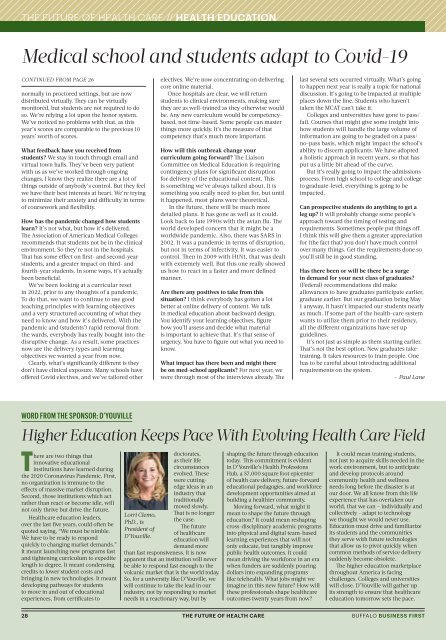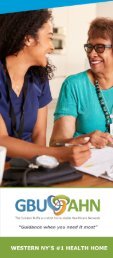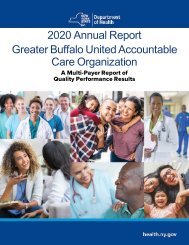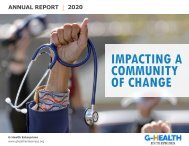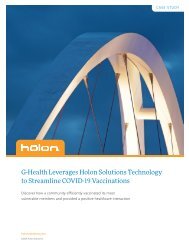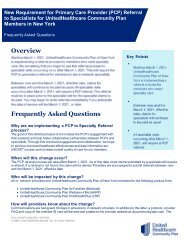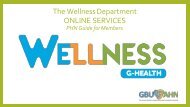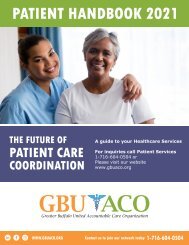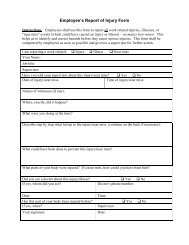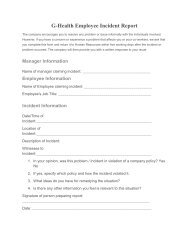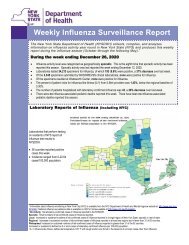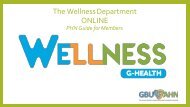Future of Health Care 2020
- No tags were found...
You also want an ePaper? Increase the reach of your titles
YUMPU automatically turns print PDFs into web optimized ePapers that Google loves.
THE FUTURE OF HEALTH CARE // HEALTH EDUCATION<br />
Medical school and students adapt to Covid-19<br />
CONTINUED FROM PAGE 26<br />
normally in proctored settings, but are now<br />
distributed virtually. They can be virtually<br />
monitored, but students are not required to do<br />
so. We’re relying a lot upon the honor system.<br />
We’ve noticed no problems with that, as this<br />
year’s scores are comparable to the previous 10<br />
years’ worth <strong>of</strong> scores.<br />
What feedback have you received from<br />
students? We stay in touch through email and<br />
virtual town halls. They’ve been very patient<br />
with us as we’ve worked through ongoing<br />
changes. I know they realize there are a lot <strong>of</strong><br />
things outside <strong>of</strong> anybody’s control. But they feel<br />
we have their best interests at heart. We’re trying<br />
to minimize their anxiety and difficulty in terms<br />
<strong>of</strong> coursework and flexibility.<br />
How has the pandemic changed how students<br />
learn? It’s not what, but how it’s delivered.<br />
The Association <strong>of</strong> American Medical Colleges<br />
recommends that students not be in the clinical<br />
environment. So they’re not in the hospitals.<br />
That has some effect on first- and second-year<br />
students, and a greater impact on third- and<br />
fourth-year students. In some ways, it’s actually<br />
been beneficial.<br />
We’ve been looking at a curricular reset<br />
in 2022, prior to any thoughts <strong>of</strong> a pandemic.<br />
To do that, we want to continue to use good<br />
teaching principles with learning objectives<br />
and a very structured accounting <strong>of</strong> what they<br />
need to know and how it’s delivered. With the<br />
pandemic and (students’) rapid removal from<br />
the wards, everybody has really bought into the<br />
disruptive change. As a result, some practices<br />
now are the delivery types and learning<br />
objectives we wanted a year from now.<br />
Clearly, what’s significantly different is they<br />
don’t have clinical exposure. Many schools have<br />
<strong>of</strong>fered Covid electives, and we’ve tailored other<br />
electives. We’re now concentrating on delivering<br />
core online material.<br />
Once hospitals are clear, we will return<br />
students to clinical environments, making sure<br />
they are as well-trained as they otherwise would<br />
be. Any new curriculum would be competencybased,<br />
not time-based. Some people can master<br />
things more quickly. It’s the measure <strong>of</strong> that<br />
competency that’s much more important.<br />
How will this outbreak change your<br />
curriculum going forward? The Liaison<br />
Committee on Medical Education is requiring<br />
contingency plans for significant disruption<br />
for delivery <strong>of</strong> the educational content. This<br />
is something we’ve always talked about. It is<br />
something you really need to plan for, but until<br />
it happened, most plans were theoretical.<br />
In the future, there will be much more<br />
detailed plans. It has gone as well as it could.<br />
Look back to late 1990s with the avian flu. The<br />
world developed concern that it might be a<br />
worldwide pandemic. Also, there was SARS in<br />
2002. It was a pandemic in terms <strong>of</strong> disruption,<br />
but not in terms <strong>of</strong> infectivity. It was easier to<br />
control. Then in 2009 with H1N1, that was dealt<br />
with extremely well. But this one really showed<br />
us how to react in a faster and more defined<br />
manner.<br />
Are there any positives to take from this<br />
situation? I think everybody has gotten a lot<br />
better at online delivery <strong>of</strong> content. We talk<br />
in medical education about backward design.<br />
You identify your learning objectives, figure<br />
how you’ll assess and decide what material<br />
is important to achieve that. It’s that sense <strong>of</strong><br />
urgency. You have to figure out what you need to<br />
know.<br />
What impact has there been and might there<br />
be on med-school applicants? For next year, we<br />
were through most <strong>of</strong> the interviews already. The<br />
last several sets occurred virtually. What’s going<br />
to happen next year is really a topic for national<br />
discussion. It’s going to be impacted at multiple<br />
places down the line. Students who haven’t<br />
taken the MCAT can’t take it.<br />
Colleges and universities have gone to pass/<br />
fail. Courses that might give some insight into<br />
how students will handle the large volume <strong>of</strong><br />
information are going to be graded on a pass/<br />
no-pass basis, which might impact the school’s<br />
ability to discern applicants. We have adopted<br />
a holistic approach in recent years, so that has<br />
put us a little bit ahead <strong>of</strong> the curve.<br />
But it’s really going to impact the admissions<br />
process. From high school to college and college<br />
to graduate-level, everything is going to be<br />
impacted.<br />
Can prospective students do anything to get a<br />
leg up? It will probably change some people’s<br />
approach toward the timing <strong>of</strong> testing and<br />
requirements. Sometimes people put things <strong>of</strong>f.<br />
I think this will give them a greater appreciation<br />
for (the fact that) you don’t have much control<br />
over many things. Get the requirements done so<br />
you’ll still be in good standing.<br />
Has there been or will be there be a surge<br />
in demand for your next class <strong>of</strong> graduates?<br />
(Federal) recommendations did make<br />
allowances to have graduates participate earlier,<br />
graduate earlier. But our graduation being May<br />
1 anyway, it hasn’t impacted our students nearly<br />
as much. If some part <strong>of</strong> the health-care system<br />
wants to utilize them prior to their residency,<br />
all the different organizations have set up<br />
guidelines.<br />
It’s not just as simple as them starting earlier.<br />
That’s not the best option. New graduates take<br />
training. It takes resources to train people. One<br />
has to be careful about introducing additional<br />
requirements on the system.<br />
— Paul Lane<br />
WORD FROM THE SPONSOR: D’YOUVILLE<br />
Higher Education Keeps Pace With Evolving <strong>Health</strong> <strong>Care</strong> Field<br />
There are two things that<br />
innovative educational<br />
institutions have learned during<br />
the <strong>2020</strong> Coronavirus Pandemic. First,<br />
no organization is immune to the<br />
effects <strong>of</strong> massive market disruption.<br />
Second, those institutions which act<br />
rather than react or become idle, will<br />
not only thrive but drive the future.<br />
<strong>Health</strong>care education leaders,<br />
over the last five years, could <strong>of</strong>ten be<br />
quoted saying, “We must be nimble.<br />
We have to be ready to respond<br />
quickly to changing market demands.”<br />
It meant launching new programs fast<br />
and tightening curriculum to expedite<br />
length to degree. It meant condensing<br />
credits to lower student costs and<br />
bringing in new technologies. It meant<br />
developing pathways for students<br />
to move in and out <strong>of</strong> educational<br />
experiences, from certificates to<br />
Lorri Clemo,<br />
PhD., is<br />
President <strong>of</strong><br />
D’Youville.<br />
doctorates,<br />
as their life<br />
circumstances<br />
evolved. These<br />
were cuttingedge<br />
ideas in an<br />
industry that<br />
traditionally<br />
moved slowly.<br />
That is no longer<br />
the case.<br />
The future<br />
<strong>of</strong> healthcare<br />
education will<br />
demand more<br />
than fast responsiveness. It is now<br />
apparent that an institution will never<br />
be able to respond fast enough to the<br />
volcanic market that is the world today.<br />
So, for a university like D’Youville, we<br />
will continue to take the lead in our<br />
industry, not by responding to market<br />
needs in a reactionary way, but by<br />
shaping the future through education<br />
today. This commitment is evident<br />
in D’Youville’s <strong>Health</strong> Pr<strong>of</strong>essions<br />
Hub, a 57,000 square foot epicenter<br />
<strong>of</strong> health care delivery, future-forward<br />
educational pedagogies, and workforce<br />
development opportunities aimed at<br />
building a healthier community.<br />
Moving forward, what might it<br />
mean to shape the future through<br />
education? It could mean reshaping<br />
cross-disciplinary academic programs<br />
into physical and digital team-based<br />
learning experiences that will not<br />
only educate, but tangibly improve<br />
public health outcomes. It could<br />
mean driving the workforce in an era<br />
when funders are suddenly pouring<br />
dollars into expanding programs<br />
like telehealth. What jobs might we<br />
imagine in this new future? How will<br />
these pr<strong>of</strong>essionals shape healthcare<br />
outcomes twenty years from now?<br />
It could mean training students,<br />
not just to acquire skills needed in the<br />
work environment, but to anticipate<br />
and develop protocols around<br />
community health and wellness<br />
needs long before the disaster is at<br />
our door. We all know from this life<br />
experience that has overtaken our<br />
world, that we can – individually and<br />
collectively - adapt to technology<br />
we thought we would never use.<br />
Education must drive and familiarize<br />
its students and the communities<br />
they serve with future technologies<br />
that allow us to pivot quickly when<br />
common methods <strong>of</strong> service delivery<br />
suddenly become obsolete.<br />
The higher education marketplace<br />
throughout America is facing<br />
challenges. Colleges and universities<br />
will close. D’Youville will gather up<br />
its strength to ensure that healthcare<br />
education tomorrow sets the pace.<br />
28 THE FUTURE OF HEALTH CARE BUFFALO BUSINESS FIRST


